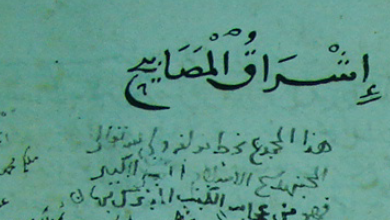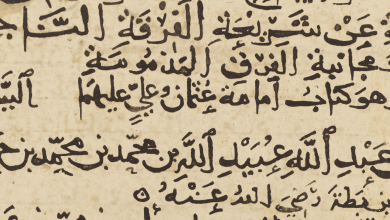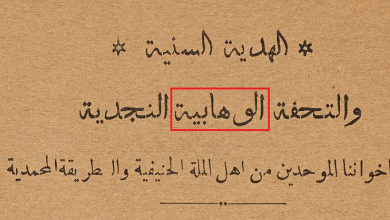IMĀM ‘ALĪ AL-QĀRĪ (D. 1014 AH) MENTIONED THE WAY OF THE SALAF BEING TAFWĪḌ AL-MA’NĀ, AND IT BEING THE WAY OF IMĀM ABŪ ḤANĪFA
Imām ‘Alī al-Qārī (d. 1014 AH) in his Ḍaw’ al-Ma’ālī li-Bad’ al-Amālī (pp. 33-34) mentioned the way of the Salaf being Tafwīḍ al-Ma’nā, and it being the way of Imām Abū Ḥanīfa:
Arabic quotes followed by English translation:
ومذهب الخلف جواز تأويل الاستواء بالاستيلاء ومختار السلف عدم التأويل بل اعتقاد التنزيل مع وصف التنزيه له سبحانه عما يوجب التشبيه وتفويض الأمر الى الله وعلمه في المراد به كما قال الامام مالك الاستواء معلوم والكيف مجهول والسؤال عنه بدعة والايمان واجب واختاره امامنا الاعظم وكذا كل ما مورر من الاآيات والاحاديث المتشابهات من ذكر اليد
والعين والوجه ونحوها من الصفات ومنه لفظ فوق فى قوله تعالى وهو القاهر فوق عباده وفي قوله سبحانه وتعالى يخافون ربهم من فوقهم فلا يؤولونه بالعظمة والرفعة كما قال به الخلف ولما عبر الناظم بالفوقية وغير العبارة القرآنية لضرورة النظم استدركه بقوله لكن بلا وصف التمكن واتصال أي بلا وصف الاستقرار ولانعت الاتصال لان كلاهما في حق الله من المحال وفيه رد على الكرامية والمجسمة في اثبات الجهة فان والمجسمة وهم الحشوية الكرامية يثبتون جهة العلو من غير استقرار على العرش
يصر حون بالاستقرار على
العرش بظاهر الا ية ولا
حجة فيها لان الاستواء له
معان كا لاستيلاء ومنه قول الشاعر قد استوى بشر على العراق من غير سيف و دم مهراق وكالتمام والكمال و منه قوله تعالى ولما بلغ اشده واستوى و کالا استقرار ومنه قوله تعالى واستوت على الجودي فلا استدلال مع تعدد الاحتمال فان قيل فما الفائدة حينئذ في نزول المتشابهات أجيب بان فائدته اظهار عجز الخلق وقصور فهمهم عن كلام ربهم وتعبدهم بإيمانهم فيقول الراسخون في العلم منهم آمنا به كل من عند ربنا فالتفويض الى الله و الاعتقاد بحقيقة مراد الله من غيران يعرف مراده من كمال العبودية في العبد الرسالة .
ولهذا اختاره السلف والتعرض الى تفسير المتشابهات وتأويلها كما اختاره
الخلف غير جازمين بأنه مراده سبحانه عبادة فى العبد الا ان البعودية أقوى من العبادة لان العبودية هي: الرضا بما يفعل الرب والعبادة هي فعل ما يرضى به الرب والرضا فوق العمل حتى كان ترك الرضا كفر او ترك العمل . فسقا ولذلك تسقط العبادة في الآخرة والعبودية لا تسقط في الدارين وبهذا تبين ان مذهب السلف أسلم وأعلم
ومذهب الخلف احكم
The doctrine (Madhhab) of the later scholars (khalaf) permits Ta’wīl (figurative interpretation) of istiwā’ (establishment on the Throne) to mean dominion (al-istīlāʾ), while the chosen way of the predecessors (Salaf) is to avoid Ta’wīl, rather to believe in the revelation while maintaining divine transcendence (Tanzih) from anything that necessitates anthropomorphism (tashbih), and to practice Tafwīḍ (delegating the meaning) to Allah and His knowledge regarding its intended meaning, as Imam Mālik said: “The istiwā’ is known, the ‘how’ is unknown, asking about it is innovation, and believing in it is obligatory.” Our greatest Imam (Abu Hanifa) chose this position, as with all passed-down (Qur’anic) verses and mutashābih (ambiguous) hadiths mentioning the hand, eye, face, and similar attributes (Sifat).
From these is the word “above” in His saying “And He is the Subjugator above His servants” and in His saying “They fear their Lord from above them.” They do not interpret it as greatness and elevation as the later scholars did. When the versifier expressed “aboveness” differently from the Quranic expression due to poetic necessity, he qualified it by saying “but without attribute of enablement and connection” – meaning without the attribute of settling (al-Istiqrar) or connection, as both are impossible regarding Allah. This refutes the Karrāmiyya and anthropomorphists (Mujassima) in establishing direction (Jiha), for the anthropomorphists, who are the Ḥashwiyya (see here – https://taymiyyun.wordpress.com/tag/hashwiyya/ ), establish a direction of above without settling on the throne.
They explicitly state settling on the throne based on the ẓāhir (outward meaning) of the verse, but there is no evidence in it because istiwā’ has multiple meanings, such as dominion (al-istīlāʾ) – as in the poet’s saying “Bishr has established over Iraq without sword or spilled blood” – and completion and perfection, as in His saying “And when he reached his maturity and became complete,” and settling as in His saying “And it (the ark) settled on Mount Jūdī.” There is no definitive proof with multiple possibilities.
If asked about the benefit of revealing the mutashābih verses, the answer is to show creation’s inability and their limited understanding of their Lord’s speech, and to test their faith through their belief. Thus, the firmly grounded in knowledge among them say “We believe in it, all is from our Lord.” So Tafwīḍ to Allah and believing in the ḥaqīqī (literal) meaning intended by Allah without knowing His intent is from the perfection of servitude in the servant.
This is why the predecessors (Salaf) chose this, while addressing the explanation of mutashābih verses and their Ta’wīl as chosen by the later scholars, without being certain it is His intended meaning. Glory be to Him, servitude in the servant is stronger than worship because servitude is being pleased with what the Lord does, while worship is doing what pleases the Lord. And pleasure is above action, such that abandoning pleasure is disbelief while abandoning action is sin. Therefore, worship drops in the hereafter while servitude does not drop in both abodes. Through this, it becomes clear that the way of the predecessors (Salaf) is safer and more knowledgeable, while the way of the later scholars (Khalaf) is wiser.
For more on what is Tafwīḍ al-Ma’nā see a full book here –
How to understand the Attributes of Allah – al-Qawl al-Tamam






